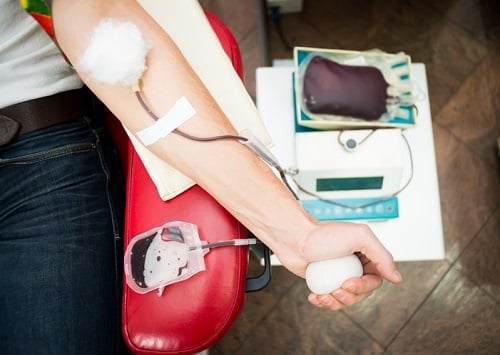Economists and medical professionals argue that paying for blood donation is acceptable and urgently needed

Health Canada was recently accused of neglecting its duty to protect the public’s health by allowing for-profit blood-collection. Critics allege that for-profit businesses target impoverished individuals, raising ethical and safety concerns.
Opposition to this practice is more evident at a provincial level, where a number of provinces ban paid for blood donations altogether. Quebec, Ontario, and Alberta all prohibit paying individuals for plasma, which is usually processed into plasma-derived medicinal products (PDMPs). However, a health expert states this stance has created an unhealthy dependence on the US.
“In 2016, Canada paid the US $512 million dollars to provide more than 80% of the blood products — specifically immune globulins — they needed to care for their citizens,” said Dr. Charles Dinerstein, senior medical fellow at the American Council on Science and Health.
Citing an open letter penned by economists, Dinerstein outlined several arguments to refute the position that paid for donations are exploitive and unsafe, commoditize body parts, and should be driven by altruism rather than money.
First, he noted, compensation for plasma donation is not a steady income and donors receive 30% of the plasma’s final value. “So economically it is not clear if anyone is actually being exploited. And if exploitation is an issue, is it more ethical to mine the circulatory system of Americans rather than Canadians?” Compensated and uncompensated blood donations are also subject to the same safety checks for transmissible disease.
The act of paying for and sharing blood also doesn’t devalue human bodies, Dinerstein wrote. Every person in the supply chain is compensated, but they view blood and blood products as vital gifts. While similar ethical concerns have been raised for paid organ donations, those arguments don’t hold as true for blood, which is a renewable resource.
Compensation doesn’t take away from the value of blood donation, he wrote. Donors’ motivations shouldn’t matter to the patients in need. And like compensation, altruism rewards the donor because it provides social satisfaction and positive signalling.
“They end with a security argument: why should Canada be beholden to another country to care for its citizens when the resources are already there?” Dinerstein wrote.
Related stories:
Doctor slams blood-collection business for targeting the poor
One in five Canadians with HIV unaware of their condition
Opposition to this practice is more evident at a provincial level, where a number of provinces ban paid for blood donations altogether. Quebec, Ontario, and Alberta all prohibit paying individuals for plasma, which is usually processed into plasma-derived medicinal products (PDMPs). However, a health expert states this stance has created an unhealthy dependence on the US.
“In 2016, Canada paid the US $512 million dollars to provide more than 80% of the blood products — specifically immune globulins — they needed to care for their citizens,” said Dr. Charles Dinerstein, senior medical fellow at the American Council on Science and Health.
Citing an open letter penned by economists, Dinerstein outlined several arguments to refute the position that paid for donations are exploitive and unsafe, commoditize body parts, and should be driven by altruism rather than money.
First, he noted, compensation for plasma donation is not a steady income and donors receive 30% of the plasma’s final value. “So economically it is not clear if anyone is actually being exploited. And if exploitation is an issue, is it more ethical to mine the circulatory system of Americans rather than Canadians?” Compensated and uncompensated blood donations are also subject to the same safety checks for transmissible disease.
The act of paying for and sharing blood also doesn’t devalue human bodies, Dinerstein wrote. Every person in the supply chain is compensated, but they view blood and blood products as vital gifts. While similar ethical concerns have been raised for paid organ donations, those arguments don’t hold as true for blood, which is a renewable resource.
Compensation doesn’t take away from the value of blood donation, he wrote. Donors’ motivations shouldn’t matter to the patients in need. And like compensation, altruism rewards the donor because it provides social satisfaction and positive signalling.
“They end with a security argument: why should Canada be beholden to another country to care for its citizens when the resources are already there?” Dinerstein wrote.
Related stories:
Doctor slams blood-collection business for targeting the poor
One in five Canadians with HIV unaware of their condition



